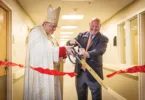Retired businessmen find post-retirement careers at Catholic Charities pantries
——————————————————————————————————————
by Joe Bollig
joe.bollig@theleaven.org
KANSAS CITY, Kan.—Bob Lippold admits that he drives the ladies a bit crazy.
But he can’t help it.
His wife Norma, God bless her, understands completely.
It has nothing to do with Lippold’s dazzling good looks or his sparkling personality. Rather, it has to do with his approach to canned food.
Lippold, a member of Curé of Ars Parish in Leawood, is a volunteer in charge of the food pantry at the Catholic Charities Family Support Center at 333 E. Poplar in Olathe. He insists that the other volunteers who assist him — mostly women — organize the pantry according to his exacting standards.
“Everything has a place, and it should be in that place,” he explained firmly. “And if you walk through, you can see all the shelves are marked. If it says peanut butter, it had better be peanut butter.”
It’s not surprising that Lippold takes a professional approach to the pantry. After all, he spent 50 years learning how to do things efficiently, first in the snack food industry and then in residential real estate.
And Lippold is not unique.
The three busiest food pantries operated by Catholic Charities of Northeast Kansas are run by retired executives. They bring skills, savvy, and a desire to serve to their “second careers.”
Something good to do
A lot of people retire at or around age 65. Not Lippold. He retired at age 72 — on Dec. 31, 2000.
“What’s normal retirement age?” he said. “I never considered [65] normal retirement.”
A lot of people dream about days of uninterrupted golf when they retire. Not Lippold. He hates golf. And he hates inactivity.
“If I don’t have something to do today, I’m bored,” he said. “I want something to do. I’m old and I’m active.”
Within months of his retirement, he was looking for something to do. A former business associate, Mark J. Henke, was executive director of Catholic Charities at the time. He steered Lippold to Mary Kay Drees, director of volunteers, and she sent him to Shirley Kelso, then-director of the south Johnson County center.
As luck would have it, Lippold’s visit co-incided with a planned remodeling of the food pantry. Kelso told Lippold he could organize the pantry any way he wanted — if he took the job.
It sounded like his kind of challenge; seven years later Lippold is still on the job.
Jeffery Bailey’s story is much like Lippold’s.
Bailey, a member of Ascension Parish in Overland Park, was 55 when he retired from his position as general manager of the lubricants division of Phillips Petroleum. Like Lippold, he didn’t want rest and rust for his retirement.
“I’m not the type,” said Bailey, now 65. “I can’t sit. I wanted to do something. I didn’t want another job, so I called up Mary Kay Drees.”
“All my life I’ve been truly blessed, very lucky, very fortunate — whatever word you want to apply,” he continued. “I’ve done some charity work in the past, and I thought it was time to give back.”
At first, he drove a bus for a day care center and then worked as a backup cook. He was given charge of the pantry at 2220 Central in Kansas City, Kan., about five years ago when his day care center merged with another.
Lee Weigel, at 54, is the youngest of the pantry managers. A few years ago, Weigel, an IT consultant who attends Holy Trinity Church in Lenexa, got to the point in his life where he knew he could choose to retire early if he wanted to.
“I had the freedom to make a decision, so I decided to retire and do some traveling,” he said. “So I did.”
But it didn’t take long before he reconsidered.
“I enjoyed my freedom,” said Weigel, “but in two months I was climbing the walls.”
So he returned to work, and didn’t retire for good until 2007. At that time, the Russell native received some parting wisdom from a boyhood friend.
“A very good friend of mine from Russell, who lived in Wichita and who I went to school with, was diagnosed with cancer two years ago,” said Weigel. “I spent a lot of time with him in those last few months of his losing battle. One thing he told me was that he wished he had given back more.
“I thought, ‘I could be doing that, but I’m not.’”
Weigel found Mary Kay Drees through a Web site devoted to volunteering opportunities. She pointed him to the Family Support Center at 9806 W. 87th in Overland Park, which serves northern Johnson County, where he was promptly asked to take on the responsibility of the food pantry and serve on the center’s board.
The secret of their success
Each manager has used his skills and experience to improve his pantry.
When Bailey took charge of the Wyandotte County pantry, it bought 90 percent of its food. That took funding away from things like housing and utility assistance. Also, the pantry was small, with only three shelving units of food, and was open for only two half-days a week.
Today, the Wyandotte pantry buys less than one percent of its food and its hours have been expanded.
“About five years ago [the advisory committee] decided if they were going to have a food pantry, let’s have a real food pantry open four or five days a week,” said Bailey.
The secret of a successful food pantry is getting a steady supply of food, he said, and the pantries have learned how to keep the goods flowing by sharing surpluses and divvying up their donor base so they aren’t competing against each other.
“My big job is to make sure we always have the food we need to run the pantry,” said Bailey.
This is not easy, especially during difficult economic times when demand soars. The differences between the months, he said, can be like night and day. November through January brings an abundance of donations, but February through May can be lean.
“About six or seven months ago, I came in the back door one day and saw we only had a case of KC Masterpiece barbecue sauce and two cans of spaghetti, and that was it,” said Weigel.
That day, all he could offer people who came for help was a list of nearby food pantries run by other agencies.
All three of the Catholic Charities pantries have expanded their shelf space and freezer capacity under the three men, but the need remains constant and growing — even in places like Johnson County.
“I began talking with clients and I found out that just in this area [near the pantry] there’s a lot of Section 8 (low income) housing and a lot of people who have difficulty getting by, or who are barely getting by,” said Weigel. “It surprised me. It saddened me.
“But I’m glad we’re here for them.”
Lessons of life and generosity
Managing the food pantries has led the three men to understand poverty in ways they never had before.
“I can really feel people’s pain now, because I live it with them five days a week,” said Bailey.
Bailey is appreciative of the professional Catholic Charities staff and the anonymous donors who bring their little bags of food to churches and schools for collection.
“I see a dark side of our country down here, because there are legitimately poor people there,” he said. “But the flip side is that they have a place to go, and there are generous people out there who want to help them, without any notoriety or the government telling them to do it.”
Sure, he’s doing something for others, but his volunteerism does something for him, too.
“I like this because I see results,” said Bailey. “When I go home after we’ve fed 30 families, I feel good. I feel like I have a purpose. I see a lot of my [retired] friends who golf three or four times a week, but I have a fuller retirement.
“I get what I need doing this or I wouldn’t be here, because I’m not that nice a guy. It’s a two-way street. I do some good, but I get a lot out of it personally.”
Weigel has also learned that the reality of poverty can hide behind the mask of an allegedly well-off area like Johnson County.
“It made me much more aware that right here in Johnson County we have people in need,” he said. “We see the people, but we don’t see their needs. And we have, right here in Johnson County, a lot of people willing to share. My job is to get those two things together, somehow.”
Weigel now more fully appreciates that he — and most other people — spend most of their lives only a paycheck away from being a pantry client.
“It gives a wonderful sense of accomplishment each week to think that I did something to help someone in need, but it’s also a responsibility,” said Weigel. “I need to make sure to do the right things, so the next person in need will get some help.”






